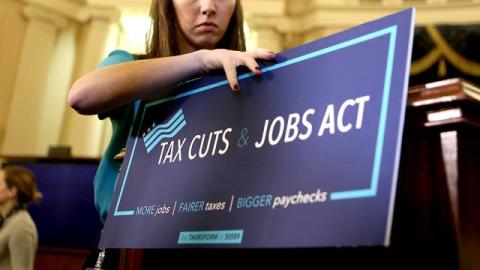In the wake of the Republican tax reform bill, which has been hailed by supporters as the most significant revision to the federal tax code in 30 years, many Democratic states and city governments are looking for ways to work around the effects of GOP tax reform.
As it turns out, the Republican-crafted tax reform law just so happens to penalize many taxpayers in states and cities that typically vote Democrat. Interestingly enough, this has led lawmakers in some of these state and local governments to propose policy changes to state and local tax law that would essentially "game" the system of federal tax law to the benefit of local residents.
Some examples are:
"One proposal would replace state income taxes, which are no longer fully deductible under the new law, with payroll taxes on employers, which are deductible. Another idea would be to allow residents to replace their state income tax payments with tax-deductible charitable contributions to their state governments."
Big corporations with a lot of money to save or lose have had a powerful incentive to game the federal tax code and exploit loopholes to avoid paying more than they have to into the federal coffers.
Yet seemingly for the first time, state and local governments feel provoked enough by what they see as partisan tax policy designed to penalize Democrats that they are getting into the game of finding federal tax loopholes and writing policy to help their constituents exploit them.
This is another example of what I predicted here at IVN nearly a year ago after Trump's ascendancy to the Oval Office, when I wrote:
"With Republicans in control of the White House and both houses of Congress, Democrats may find refuge in the use of states’ rights and even local defiance of federal policy on the city level...
Relinquishing the tactics of nullification and local resistance to federal policies they disagree with is a mistake Democrats have vocally signaled that they are not going to make.
Major metropolitan governments are the only level of US government that Democrats control today with Democratic governors outnumbered by Republican governors 31 to 19, and after losing the White House and failing to secure either chamber of Congress.
Of America’s 20 biggest cities, however, all but three are locked up by Democratic mayors and closely aligned blue electorates comprising 32 million Americans. And they have vowed to actively defy Trump."
So what are local policymakers doing to blunt the impact of the GOP tax bill on local blue taxpayers? Well, they're working on it:
"In particular, officials in the high-tax states object to the law’s $10,000 cap on state and local tax deductions, which were previously unlimited. That provision will be particularly painful for residents of states like New York, New Jersey, California and Connecticut, which have high housing costs and high tax rates.
Even in those states, most residents will get a temporary tax cut because of other provisions of the law, including lower tax rates and an increase in the standard deduction. But the cap on the state and local tax deduction could pose a serious threat to state budgets, because it makes state taxes more expensive for residents. That could make it harder for states to raise taxes, particularly on wealthy residents, and could increase pressure to cut spending.
The law could also have broader economic consequences. Business leaders, for example, have said they worry about attracting workers if New York and other cities become even more expensive than lower-tax areas.
State leaders are still figuring out their response to the new law, and few have yet endorsed specific proposals. But they are moving quickly."
Property tax reform is likely to be a big part of it though:
"Before the last property tax prepayments reached the coffers of local municipalities last week, fresh discussion had begun anew on how to solve New Jersey's never-ending property tax dilemma.
Elected officials, think tanks and academics all agree that renewed attention is being paid to New Jersey's sky-high property taxes, in light of the tax overhaul's sharp new limitations on housing-related deductions.
But they said it remains to be seen if the upcoming $10,000 cap on federal tax deductions for local property taxes will be enough to spark real reform — for long at the top of the list of New Jersey voters' concerns."
Interestingly enough, as Democrats embrace federalism and state's rights to combat the federal government, given it is the only avenue of political power open to them at the moment, Republicans seem to be undermining this once cherished conservative value:
"Republicans have often praised the American system of federalism, which allows subnational units such as cities and states to give their residents the public policies they want — with results that vary throughout the nation. Traditional conservatives have praised this, because state and local governments are 'closer' to the citizens they serve.
This tax bill goes in the opposite direction. It is likely to make it harder for state and local governments to raise their own revenue."
In all of this we can see the mind-numbing effect of partisanship on the values of the polity as they cheer on the partisan turf war over government. Partisan politicians and voters will support whatever is expedient based on their current positioning within the political landscape, not what they claim to believe in as a matter of principle or good, practical governance.
It seems that as usual, willful amnesia is the grease that oils the machine of partisan dysfunction.
